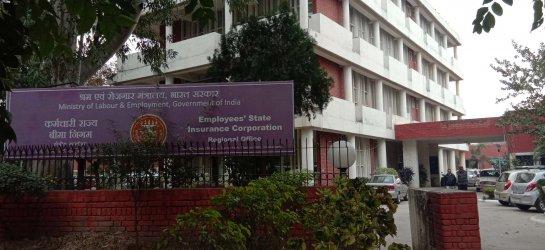CITU, AITUC Condemn Government’s Decision to Cut ESI Contributions

Representational Image. Image Courtesy: Esic.nic
In a press statement released on Friday, June 14, CITU and AITUC have strongly condemned the government’s decision to reduce ESI contribution of the employers. The trade unions have referred to the move as “unilateral and arbitrary”.
The government on Thursday had announced its decision to reduce the total rate of contribution made by workers and employers towards the Employees’ State Insurance (ESI) scheme from 6.5% to 4%.
The employer’s contribution to ESI has been reduced from 4.75% to 3.25% of the wages of the enrolled workers and the worker’s contribution from 1.75% to 1%.
While the Centre of Indian Trade Union (CITU) says that the move is not in line with the unanimous decision of the tripartite governing body meeting of ESI, the All India Trade Union Congress (AITUC) has said that the reasons cited for this decision are patently false.
Also read: Elections 2019: ‘Ache Din’ Only Led to Mass Violations of Labour Rights, Say Workers
Last year, in the 175th tripartite Governing Body meeting of ESI on September 18, it was decided to reduce the employer’s contribution to ESI to 4% and the worker’s contribution to 1%, making the total ESI contributions at 5% annually.
Even the ESI Budget for the 2019-20 financial year, in the presence of and under the chairmanship of Union Labour Minister, was finalised on the basis of the contribution generation of 5% in the 177th governing body meeting held in February 2019, the press statement added.
The sudden change in the decision regarding the contribution made by the employer to ESI attracts several questions towards the “ill-motive” of the government to benefit the employer’s lobby.
No Justification for Such Decision
Speaking to NewsClick, Tapan Sen, General Secretary of CITU, has criticised the government for their failure in understanding the true objective of the ESI scheme. He said, “The employer’s contribution to ESI shouldn’t be misunderstood as a [altruistic] contribution. It is a part of wage which the worker receives in the form of benefits. The government has basically reduced the worker’s entitlement to his/her social security.”
Being a self-financing body, even the Employees’ State Insurance Corporation (ESIC) may find it difficult to meet their administrative expenses to run the scheme as a consequence of the reduction in the contributions.
“[ESIC] is not a paternal institution of this government,” Sen added while reiterating a similar fear for the future of ESIC.
Amarjeet Kaur, General Secretary of AITUC, spoke to NewsClick about how the government is trying to avoid its responsibilities to provide better services. She said that the demand was never to cut the contributions to ESI; rather it was for the betterment of the services.
“The argument of surplus collection, based on which the reduction was justified by the government, is false. There can never be a surplus collection when the vacancies are yet to be filled, when hospitals don’t have required equipment and when the services are not expanded to reach every employee covered under the ESI scheme,” Kaur added.
Also read: Why Has Modi Govt Made Reliance Health Insurance Mandatory For J&K Employees?
According to the annual reports of ESIC, since the Bharatiya Janata Party came to power in 2014, only 3 ESIC hospitals and 82 ESI dispensaries have been built till March 2018. In the same period, around 1.47 crore people got insured under the ESI scheme, reason for which also could be attributed to the upward revision of entitlement level from Rs 15,000/ to Rs 21,000/- from January 2017.
NewsClick also contacted Virjesh Upadhyay, National Secretary of Bharatiya Mazdoor Sangh, affiliated to the Rashtriya Swayamsevak Sangh. He refused to give any comments as he was in Switzerland with the delegation of Labour and Employment Minister Santosh Kumar Gangwar to attend the International Labour Conference.
The promulgation of Employees' State Insurance Act, 1948 (ESI Act), by the Parliament was the first major legislation on social security for workers in independent India. It is designed to accomplish the task of protecting employees against the impact of incidences of sickness, maternity, disablement etc.
Get the latest reports & analysis with people's perspective on Protests, movements & deep analytical videos, discussions of the current affairs in your Telegram app. Subscribe to NewsClick's Telegram channel & get Real-Time updates on stories, as they get published on our website.
























